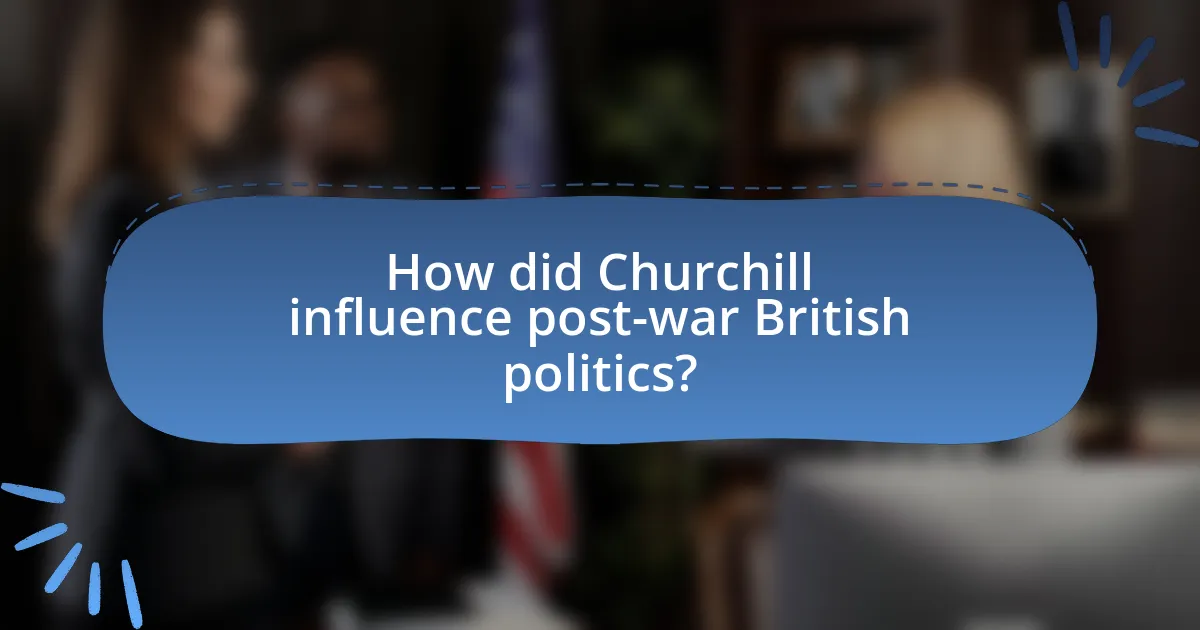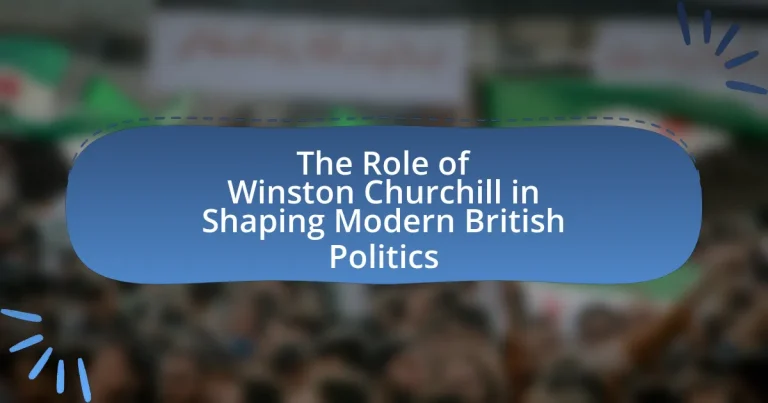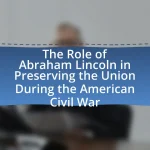Winston Churchill was a pivotal figure in shaping modern British politics, particularly through his leadership as Prime Minister during World War II from 1940 to 1945. His resolute stance against Nazi Germany and powerful speeches galvanized public support, influencing military strategy and international relations. Churchill’s early life and military experiences informed his political ideology, while his various roles in government, including Member of Parliament and Chancellor of the Exchequer, showcased his extensive influence on British policy. Post-war, he advocated for a strong British presence on the global stage and played a significant role in establishing NATO and the welfare state, leaving a lasting legacy that continues to impact contemporary political discourse.
What was Winston Churchill’s role in British politics?
Winston Churchill served as a prominent leader in British politics, most notably as Prime Minister during World War II from 1940 to 1945. His leadership was characterized by his resolute stance against Nazi Germany, rallying the British public with powerful speeches and a commitment to victory. Churchill’s policies and decisions during the war significantly shaped Britain’s military strategy and international relations, solidifying his legacy as a key figure in modern British history. His role extended beyond wartime leadership; he also influenced post-war politics, advocating for a strong British presence on the global stage and promoting the idea of a united Europe.
How did Churchill’s early life influence his political career?
Winston Churchill’s early life significantly influenced his political career by instilling in him a sense of duty, leadership, and resilience. Born into an aristocratic family, Churchill was exposed to politics and military service from a young age, as his father, Lord Randolph Churchill, was a prominent Conservative politician. This familial background provided him with insights into political dynamics and the importance of public service. Additionally, his experiences at Harrow School and the Royal Military Academy Sandhurst fostered his leadership skills and competitive spirit, which he later applied in his political endeavors. Churchill’s early exposure to the challenges of leadership during his military service in conflicts such as the Second Boer War further shaped his understanding of strategy and governance, ultimately informing his decisions as a statesman during critical moments in British history, such as World War II.
What key experiences shaped Churchill’s political ideology?
Winston Churchill’s political ideology was shaped by key experiences such as his military service in the Second Boer War, his role in World War I, and his leadership during World War II. His time in the Boer War, where he was captured and later escaped, instilled in him a sense of resilience and a belief in the importance of military strength. During World War I, his tenure as First Lord of the Admiralty and the failure of the Gallipoli Campaign taught him about the complexities of military strategy and the necessity of effective leadership. Finally, his leadership during World War II, particularly his speeches and determination to resist Nazi Germany, solidified his belief in democracy, national sovereignty, and the need for strong leadership in times of crisis. These experiences collectively influenced his views on governance, war, and the role of Britain in the world.
How did his military service impact his political decisions?
Winston Churchill’s military service significantly influenced his political decisions by instilling a strong sense of leadership and strategic thinking. His experiences during conflicts such as the Second Boer War and World War I shaped his understanding of military affairs and the importance of national defense. For instance, Churchill’s role as First Lord of the Admiralty during World War I led him to advocate for innovative naval strategies, including the use of tanks and aircraft, which later informed his decisions during World War II. His military background also fostered a belief in the necessity of decisive action, as evidenced by his rallying speeches that emphasized resilience and determination in the face of adversity.
What were the major political positions held by Churchill?
Winston Churchill held several major political positions throughout his career, including Member of Parliament, First Lord of the Admiralty, Minister of Munitions, Chancellor of the Exchequer, and Prime Minister of the United Kingdom. As a Member of Parliament, he served in various capacities from 1900 until his retirement in 1964. His role as First Lord of the Admiralty during World War I was pivotal in naval strategy, while his tenure as Minister of Munitions in 1917 was crucial for wartime production. Churchill’s time as Chancellor of the Exchequer from 1924 to 1929 involved significant economic policy decisions. Most notably, he served as Prime Minister during World War II from 1940 to 1945, leading Britain through its darkest hours and shaping its post-war recovery. These positions collectively illustrate Churchill’s influence on British politics and governance.
What role did Churchill play as a Member of Parliament?
Winston Churchill served as a Member of Parliament (MP) for over six decades, playing a crucial role in British politics. He was first elected as an MP in 1900 and held various positions, including Minister of Munitions and Chancellor of the Exchequer. Churchill’s influence was significant during key historical events, such as World War I and World War II, where he advocated for military preparedness and national unity. His speeches and policies as an MP helped shape public opinion and government strategy, particularly during the 1940s when he became Prime Minister. His tenure in Parliament was marked by his ability to navigate complex political landscapes and rally support for his vision of Britain.
How did his tenure as Prime Minister shape British policy?
Winston Churchill’s tenure as Prime Minister significantly shaped British policy through his leadership during World War II and his post-war vision for Europe. His wartime policies emphasized national unity, military strategy, and resilience, which galvanized public support and established a strong national identity. Churchill’s advocacy for the establishment of the United Nations and his vision of a “United States of Europe” laid the groundwork for future European integration, influencing Britain’s approach to international relations and cooperation. His speeches and policies promoted the idea of a strong Britain on the global stage, which shaped foreign policy decisions for decades.
What impact did Churchill have during World War II?
Winston Churchill had a significant impact during World War II as the Prime Minister of the United Kingdom, leading the nation through its most challenging period. His leadership was characterized by powerful oratory that inspired British resilience, exemplified by speeches such as “We shall fight on the beaches,” which rallied public support and maintained morale. Churchill’s strategic decisions, including the prioritization of defeating Nazi Germany over other Axis powers, were crucial in shaping Allied military strategy. His role in forming key alliances, particularly with the United States and the Soviet Union, facilitated critical support through initiatives like Lend-Lease, which provided essential resources to Britain. Additionally, Churchill’s insistence on a united front against fascism helped solidify the coalition that ultimately led to the defeat of the Axis powers.
How did Churchill’s leadership style affect wartime Britain?
Churchill’s leadership style significantly affected wartime Britain by instilling resilience and determination in the British populace during World War II. His oratory skills and ability to communicate a vision of victory rallied the nation, exemplified by speeches such as “We shall fight on the beaches,” which inspired hope and unity. Churchill’s decisiveness in military strategy, including the emphasis on air power during the Battle of Britain, demonstrated his commitment to aggressive defense, ultimately contributing to Britain’s survival against Nazi Germany. His leadership fostered a sense of national identity and purpose, which was crucial in maintaining public morale during challenging times.
What were Churchill’s key speeches and their significance?
Winston Churchill’s key speeches include the “We Shall Fight on the Beaches” speech delivered on June 4, 1940, and the “Their Finest Hour” speech delivered on June 18, 1940. These speeches were significant as they rallied British morale during World War II, emphasizing resilience and determination in the face of adversity.
In the “We Shall Fight on the Beaches” speech, Churchill outlined Britain’s commitment to continue fighting against Nazi Germany, reinforcing the idea of never surrendering. This speech was pivotal in uniting the British public and maintaining support for the war effort. The phrase “We shall never surrender” became a rallying cry for the nation.
Similarly, the “Their Finest Hour” speech highlighted the critical moment Britain faced and called for unity among the British people. Churchill’s use of evocative language and imagery inspired confidence and determination, which were essential for sustaining public support during the war.
These speeches not only solidified Churchill’s role as a wartime leader but also contributed to shaping British national identity and resolve during a time of crisis.

How did Churchill influence post-war British politics?
Winston Churchill significantly influenced post-war British politics through his leadership style, policies, and vision for a united Europe. His role as Prime Minister during World War II established him as a national hero, which bolstered his political capital in the immediate post-war period. Churchill’s advocacy for a strong anti-communist stance and his famous “Iron Curtain” speech in 1946 highlighted the emerging Cold War dynamics, shaping the political discourse around national security and foreign policy. Additionally, his support for the establishment of the Council of Europe in 1949 laid the groundwork for European integration, influencing subsequent British policies towards Europe. His emphasis on maintaining a strong British presence on the global stage also affected the direction of post-war foreign policy, as seen in his push for the special relationship with the United States.
What were the main policies introduced by Churchill after the war?
Winston Churchill introduced several key policies after World War II, primarily focusing on foreign relations, economic recovery, and social reform. His “Iron Curtain” speech in 1946 emphasized the need for a strong stance against Soviet expansionism, marking the beginning of the Cold War. Economically, Churchill’s government prioritized rebuilding Britain through the Marshall Plan, which provided substantial American financial aid to help restore the British economy. Additionally, he supported the establishment of the National Health Service, aiming to improve public health and welfare. These policies were instrumental in shaping post-war British society and politics, reflecting Churchill’s commitment to both national security and social progress.
How did Churchill’s vision for Britain shape the welfare state?
Churchill’s vision for Britain significantly influenced the development of the welfare state by advocating for a strong national government that prioritized social responsibility. His belief in the need for a cohesive society led to the establishment of policies aimed at improving public health, education, and housing. For instance, during World War II, Churchill supported the Beveridge Report, which identified key social issues and proposed comprehensive reforms to address poverty and unemployment. This report laid the groundwork for the post-war welfare state, emphasizing the government’s role in ensuring citizens’ well-being. Churchill’s commitment to social reform and national unity thus directly shaped the framework of modern British welfare policies.
What role did Churchill play in the establishment of NATO?
Winston Churchill played a significant role in the establishment of NATO by advocating for collective security among Western nations. His 1946 “Iron Curtain” speech emphasized the need for unity against the Soviet threat, laying the groundwork for transatlantic cooperation. Churchill’s vision was instrumental in shaping the discussions that led to the formation of NATO in 1949, as he consistently promoted the idea of a military alliance to ensure peace and stability in Europe post-World War II. His influence is evident in the founding principles of NATO, which aimed to deter aggression through mutual defense, reflecting Churchill’s belief in the necessity of a united front against totalitarianism.
How did Churchill’s political philosophy evolve over time?
Winston Churchill’s political philosophy evolved from a belief in imperialism and traditional conservatism to a more pragmatic approach that embraced social welfare and international cooperation. Initially, Churchill supported the British Empire and opposed social reforms, as seen in his early opposition to the 1906 Liberal government’s social policies. However, during the 1940s, particularly during World War II, he recognized the need for a united front against totalitarianism, leading him to advocate for a welfare state post-war, as evidenced by his support for the Beveridge Report in 1942, which aimed to address social issues like poverty and health care. This shift reflected a broader understanding of the interconnectedness of global politics and the necessity of social responsibility in governance.
What were the key ideological shifts in Churchill’s career?
Winston Churchill experienced significant ideological shifts throughout his career, notably transitioning from a Liberal to a Conservative stance. Initially, Churchill was a member of the Liberal Party, advocating for social reforms and free trade, as evidenced by his support for the 1909 People’s Budget. However, after World War I, he shifted towards the Conservative Party, emphasizing national defense and imperialism, particularly during his tenure as First Lord of the Admiralty and later as Prime Minister during World War II. This shift was marked by his strong opposition to socialism and his belief in a robust British Empire, which he articulated in speeches and policies aimed at rallying the nation during times of crisis.
How did Churchill’s views on imperialism change?
Winston Churchill’s views on imperialism evolved significantly over his political career, particularly influenced by the changing global landscape and the aftermath of World War II. Initially, Churchill was a staunch advocate of the British Empire, believing in its civilizing mission and the necessity of maintaining imperial control for national security and economic prosperity. However, by the late 1940s, as decolonization movements gained momentum and the geopolitical context shifted, Churchill began to recognize the impracticality of maintaining the empire. His later speeches reflected a more pragmatic approach, acknowledging the need for cooperation with former colonies and the importance of self-determination. This shift was evident in his acceptance of India’s independence in 1947, marking a significant departure from his earlier imperialist stance.
What is Churchill’s legacy in modern British politics?
Churchill’s legacy in modern British politics is characterized by his embodiment of strong leadership during crises and his influence on national identity. His tenure as Prime Minister during World War II established him as a symbol of resilience, which continues to resonate in British political culture. Churchill’s speeches and policies emphasized the importance of democracy and freedom, shaping the narrative of British exceptionalism. His role in the establishment of the welfare state post-war, through the Beveridge Report, also laid the groundwork for modern social policies. Furthermore, his stance against the Soviet Union during the Cold War contributed to the ideological framework of contemporary British foreign policy. These elements collectively underscore Churchill’s lasting impact on the political landscape of Britain.
How is Churchill remembered in contemporary political discourse?
Churchill is remembered in contemporary political discourse as a symbol of resilience and leadership during times of crisis. His role as Prime Minister during World War II, particularly his speeches that rallied the British public, is frequently referenced in discussions about national unity and determination. For instance, his famous “We shall fight on the beaches” speech is often cited as an example of effective oratory that inspires collective action. Additionally, Churchill’s complex legacy, including his views on imperialism and race, is debated among politicians and historians, reflecting the multifaceted nature of his impact on modern British politics. This duality in his remembrance highlights both his contributions to wartime leadership and the controversies surrounding his policies, making him a pivotal figure in ongoing political discussions.
What lessons can modern politicians learn from Churchill’s leadership?
Modern politicians can learn the importance of resilience and effective communication from Churchill’s leadership. Churchill demonstrated unwavering determination during World War II, famously stating, “We shall fight on the beaches,” which inspired a nation facing adversity. His ability to articulate a vision and rally public support through speeches and broadcasts was crucial in maintaining morale. Additionally, Churchill’s strategic decision-making, such as forming alliances and adapting to changing circumstances, underscores the need for flexibility and collaboration in leadership. These elements of his leadership style remain relevant for contemporary politicians navigating complex political landscapes.
How has Churchill’s image been used in political campaigns?
Churchill’s image has been utilized in political campaigns to evoke themes of leadership, resilience, and national unity. Political parties, particularly the Conservative Party, have drawn on his wartime persona to inspire confidence and patriotism among voters. For instance, during the 2015 general election, the Conservative campaign featured Churchill’s likeness and quotes to associate their policies with his legacy of strength and determination in the face of adversity. This strategic use of Churchill’s image reinforces the narrative of stability and effective governance, appealing to voters’ emotions and historical sentiments.
What practical insights can be drawn from Churchill’s political strategies?
Churchill’s political strategies emphasize the importance of strong leadership, effective communication, and adaptability in times of crisis. His ability to inspire confidence through powerful oratory, as demonstrated in speeches like “We shall fight on the beaches,” rallied the British public during World War II, showcasing the impact of persuasive communication on national morale. Additionally, Churchill’s strategic alliances, such as fostering relationships with the United States, highlight the necessity of collaboration in achieving political objectives. His willingness to adapt policies in response to changing circumstances, such as shifting from appeasement to a more confrontational stance against Nazi Germany, illustrates the value of flexibility in political strategy. These insights underscore the significance of leadership, communication, collaboration, and adaptability in effective political practice.
How can Churchill’s communication style be applied today?
Churchill’s communication style can be applied today by emphasizing clarity, emotional resonance, and persuasive rhetoric. His ability to convey complex ideas in simple language, as demonstrated in his speeches during World War II, effectively rallied public support and instilled hope. For instance, his famous “We shall fight on the beaches” speech not only articulated resolve but also connected emotionally with the audience, fostering a sense of unity and purpose. Modern leaders can adopt similar techniques by using storytelling, vivid imagery, and direct language to engage their audiences, thereby enhancing their influence and effectiveness in communication.
What strategies did Churchill use to unite the nation during crises?
Winston Churchill employed several strategies to unite the nation during crises, primarily through powerful oratory, fostering a sense of shared purpose, and leveraging media. His speeches, such as “We shall fight on the beaches,” inspired resilience and determination among the British people during World War II, effectively rallying public support. Churchill emphasized national unity by framing the conflict as a collective struggle against tyranny, which resonated deeply with citizens. Additionally, he utilized radio broadcasts to communicate directly with the populace, ensuring that his messages reached a wide audience and reinforced a sense of solidarity. These strategies were pivotal in maintaining morale and cohesion during challenging times, as evidenced by the widespread public support for his leadership throughout the war.


